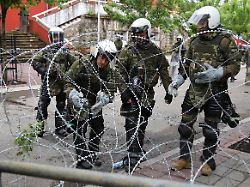“Crisis atmosphere created”
US throws Kosovo out of military exercise
05/31/2023, 10:18 am
Kosovo is a fragile entity. The region, inhabited by Albanians and Serbs, is struggling for international recognition. After disputed elections, ethnic conflicts have broken out again. The EU and the USA address clear words to the government. The latter are also openly threatening to withdraw diplomatic aid.
After fierce clashes over the appointment of ethnic Albanian mayors in Kosovo, the US imposed its first sanctions on the country, barring it from a military exercise. Kosovo will be excluded from the joint maneuver called Defender 23, in which 20 countries will take part from April to June, said US Ambassador to Pristina Jeffrey Hovenier. “For Kosovo, this exercise is over,” he told local media.
“The measures taken by the Kosovar government (…) have created this atmosphere of crisis in the north,” explained the ambassador. The violent clashes in northern Kosovo erupted when the government in Pristina tried to use the police to appoint ethnic Albanian mayors.
Hovenier also threatened to end US diplomatic support for international recognition of the small Balkan country: “You don’t find much enthusiasm on the part of the United States to cater to Kosovo’s other interests, such as engaging in non-recognition cases or actively working to European or Euro-Atlantic way of Kosovo,” said Hovenier. Russia, China and some European countries do not recognize Kosovo’s independence.
KFOR soldiers injured in riots
In April, the Kosovar authorities held local elections in four Serb-majority towns. However, the Serbs largely boycotted the elections, so the Albanian minority took control of the municipal councils despite an overall turnout of less than 3.5 percent. Kosovar Prime Minister Albin Kurti formally appointed the mayors – contrary to demands from the EU and the USA. There were vehement protests. The demonstrators are demanding the withdrawal of the Kosovan security forces from the region and the removal of the ethnic Albanian mayors.
During protests in Zvecan, soldiers from the international security force KFOR were attacked, and 30 of them were injured. They opposed Serbian demonstrators who wanted to storm the city administration. NATO responded by strengthening KFOR.
Kosovo, a country of 1.8 million people with a majority ethnic Albanian population, declared its independence from Serbia in 2008, but Belgrade still regards it as a Serbian province to this day. Around 120,000 Serbs live in Kosovo, mostly in the north of the country.
